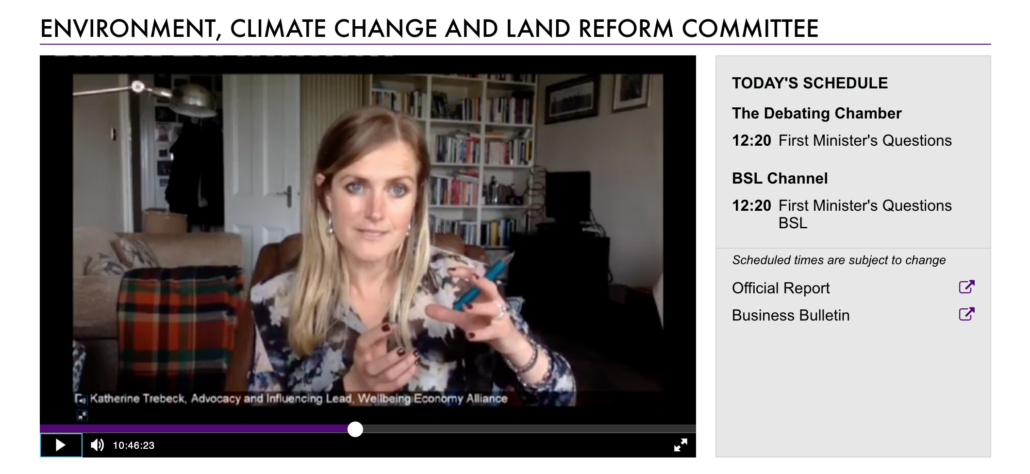This website uses cookies so that we can provide you with the best user experience possible. Cookie information is stored in your browser and performs functions such as recognising you when you return to our website and helping our team to understand which sections of the website you find most interesting and useful.
Blog by Isabel Nuesse
Busy as ever, Katherine Trebeck, WEAll’s Influencing and Advocacy Lead, has been speaking on panels, podcasts, webinars and academic lectures to encourage stakeholders to take a hard look at the feasibility of building back better to a wellbeing economy.
In Scotland, she continues to work alongside the WEAll Scotland Hub to influence the Scottish Government to move beyond GDP, to adopt wellbeing economic policies and serve as an example for the rest of the world.
Diminishing Marginal Returns

On August 28th, Katherine Trebeck spoke at the SURF Festival, opening with a few major issues in the current system, which are underpinned by our dependence on growth and GDP.
Those countries that have ‘arrived’ (i.e. have the capacity to provide decent living for their residents) experience diminishing marginal returns of growth i.e. where growth is no longer improving our quality of life. Instead, growth is driving failure demand: public spending on patching up the damage created in the pursuit of more growth.
An example of this reactive and avoidable spending is in the ‘guard labour’ industry, which is thriving because widening inequalities has made people afraid of one another. Meanwhile, individually, we are spending on pseudo satisfiers to fulfill our need of belonging – something that our economic and social system should be enabling.
Watch her entire presentation here.
Demographics and COVID
Most recently, Katherine spoke to the Environment, Climate Change and Land Reform Committee in Scottish Parliament. She begins by speaking about what demographics in our economy are most affected by the COVID pandemic.
She cites research which concludes that Black and Minority communities have shouldered more risk during the pandemic, as have women. Women were already more likely to feature in front-line sectors or service-based sectors of the economy. In addition to this increased exposure, as a result of the pandemic, women have also had to take on additional burdens of childcare and domestic work.

Hope for the future
However, Katherine also sheds light on positive developments, like the now mainstream questions around the necessity of business travel. She also mentioned the enormous increase of the gift economy. That has kept communities and families going, even though this is not accounted for in the GDP measurement.
Watch the full video of Katherine and the other prominent speakers discuss Building Back Better in Scotland post COVID-19.
the discussion?
Let us know what
you would like
to write about!

